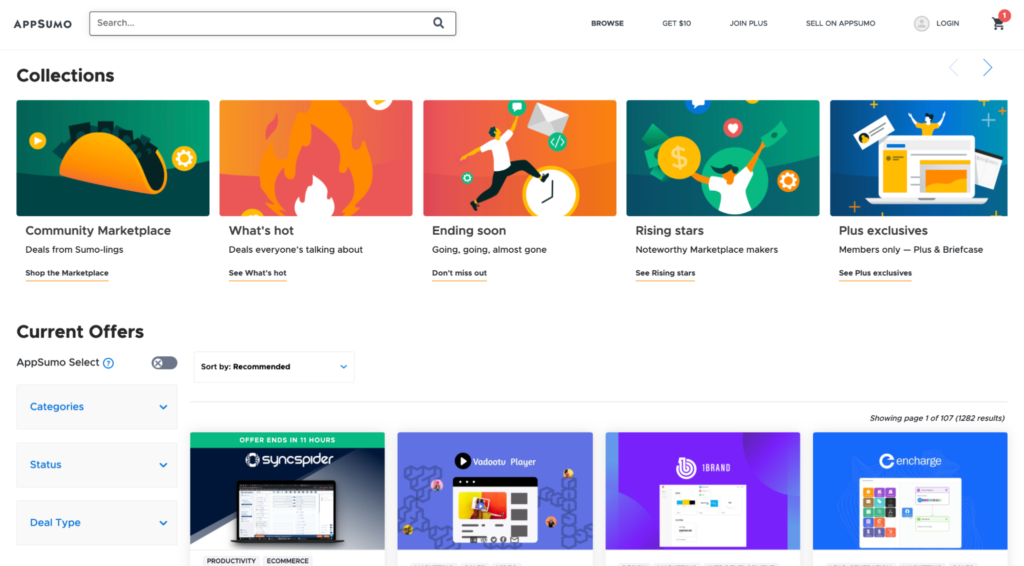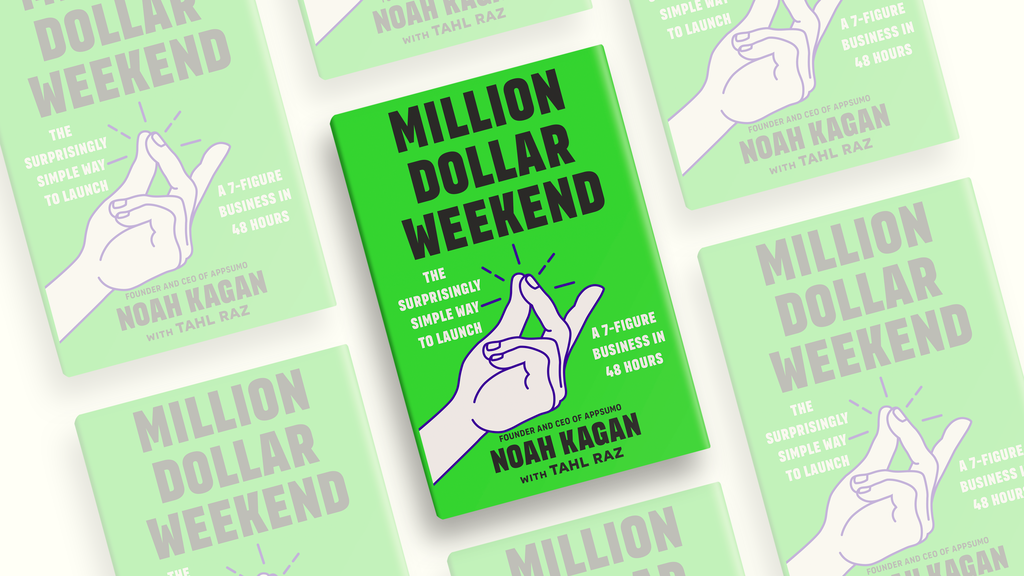How Noah Kagan built a startup that makes $80M a year - AppSumo ($7M/month)

Today's topic is AppSumo, a digital marketplace where you can discover, buy, and sell the products you need to grow your business. It was founded by Noah Kagan back in 2010.
Let’s dive into Noah’s journey:
In 2006, Noah was one of the early employees of Facebook, but after 9 months he was fired, leading him to lose $185M (in shares).

But guess what? Beyond the value of the shares, there's something even more priceless—creating something for yourself.
Four years later, after working with other companies and launching side projects, Noah, thanks to his experience in the tech industry, realized that many entrepreneurs couldn't afford high-quality software, while software creators were struggling to market their products effectively.
Therefore, he started a business. He spent $12 to buy a domain name and paid $48 to a developer in Pakistan to build a website with a PayPal button. After just one weekend and investing $60, he was up and running.
The rest is history.
The early days...
Like any startup, AppSumo faced numerous challenges. Convincing both software developers and potential customers to trust a new platform wasn’t easy in its early days. However, Noah’s determination and marketing skills gradually attracted a small but engaged community of entrepreneurs willing to take a chance on the unique deals AppSumo offered. As AppSumo began to take shape, Noah embarked on a strategic approach to attract customers.

But how did AppSumo get its first customers?
After launching the platform, Noah reached out to the founder of Imgur (an online image sharing platform), offering to bring him customers in exchange for a percentage of sales. Then, he ran ads on Reddit, choosing the platform because Imgur was popular there, and that’s how he acquired his first 200 customers.
Sounds easy, right? But usually, when you're analyzing someone’s success in retrospect, everything seems easy when, in reality, it's not that simple—although sometimes it is easier than we think. In his book 'Million Dollar Weekend' he gives a lot of advice on how to launch a successful business. However, for our discussion, I'd like to focus on this one:
Start, or as Noah would say, 'Just fu**ing start.'
When most people consider starting a business, their first instinct is to learn more—perhaps by reading a book or taking a course—before making any decisions. It wouldn't be a bad idea if it weren't (most of the time) just an excuse to never actually start the business.

Marketing Deep Dive: How AppSumo succeeded?
In this section, we will break down AppSumo' successful marketing approach that enabled it to achieve a yearly revenue of $80 million:
- Almost 50% of AppSumo’s revenue is generated through Email Marketing. It is an exceptional acquisition channel due to its simplicity: collect the emails of your website visitors. This way, you don't have to acquire new customers every time. To clarify, you'll still need to attract new customers, but having a customer base makes it easier. Each email can potentially lead to revenue, depending on factors like quantity, the value you offer, and pricing. Email marketing is cost-effective and enables direct communication with your audience. Unlike platforms such as Facebook, where continuous payments are needed to reach your audience, email allows you to send messages multiple times without additional costs. Furthermore, you have control over and can scale email, unlike Instagram or blogs dependent on limited visibility or external algorithms. This flexibility makes email the most scalable marketing channel.
- Paid ads are a highly effective acquisition channel for AppSumo, generating over $12 million annually. Their primary platforms include Facebook and Google, with ongoing experimentation on other channels like Reddit, YouTube ads, and Display Network. Their ad strategy involves trying various approaches, including testimonial ads and influencer partnerships. These ads direct users to product pages, the homepage, or web flow landing pages to collect emails, enhancing user engagement and trust.
- SEO and content marketing are powerful acquisition channels for AppSumo, generating over $15 million annually. The key driver is SEO, contributing to a remarkable 1180% organic growth from May 2020 to April 2021. By targeting high-intent keywords and publishing frequent blog posts, they attract the right audience. Actively building backlinks boosts domain authority, gaining trust with Google. The conversion engine prompts visitors to explore AppSumo's products when they land on the blog. This streamlined process ensures effective conversion of SEO traffic into sales, seizing the opportune moment to engage potential customers.
- AppSumo's affiliate and referral program drives significant revenue, exceeding eight figures annually with over 7,000 active affiliates. It is a win-win, providing income opportunities for promoters while being a key growth driver for AppSumo. Affiliate Marketing is low cost, low risk and has a high ROI, however, to maintain its success.
- AppSumo concentrated on establishing a lively community. Through webinars, tutorials, and compelling content, they nurtured a feeling of belonging among users. This community-oriented strategy not only informed users about different tools but also facilitated networking and the exchange of ideas (and brought revenue too).

To sum up...
Noah's journey with AppSumo is an inspiring tale for budding entrepreneurs. From a simple idea, Noah envisioned a platform that would democratize access to essential tools for startups and small businesses. AppSumo evolved from a software deals marketplace to a comprehensive resource hub, offering courses, e-books, and resources on entrepreneurship, marketing, and personal development.
AppSumo's impact on entrepreneurs is profound. By making once-exclusive tools and resources accessible and affordable, Noah empowered startups worldwide. His journey showcases resilience, creativity, and determination, vital qualities for startup success.
Reflecting on Noah's path and the lessons from AppSumo's journey, we're reminded that with vision and dedication, anyone can realize their entrepreneurial dreams. Noah's story inspires hope and demonstrates that with the right mindset and resources, anything is possible.
Learnings from Noah's journey:
✅ Start Small, Start Now: Noah's approach of "Just fu**ing start" underscores the importance of taking action. Instead of overthinking and waiting for the perfect moment, Noah launched AppSumo with minimal investment and resources. This emphasizes the significance of starting small and taking decisive action, even if it means starting with limited resources.
✅ Diversify Revenue Streams: AppSumo's evolution from a software deals marketplace to a comprehensive resource hub for business growth showcases the importance of diversifying revenue streams. By expanding its offerings to include courses, e-books, and resources on entrepreneurship, marketing, and personal development, AppSumo broadened its appeal and revenue potential. This teaches us the importance of diversifying revenue streams to adapt to changing market dynamics and customer needs.
✅ Network and Seek Help: Noah Kagan's emphasis on building networks and seeking help highlights the importance of networking and collaboration in entrepreneurship. Entrepreneurs should actively seek mentorship, guidance, and support from experienced individuals and peers, recognizing that asking for help is not a sign of weakness but an opportunity for growth.
How could you replicate this idea step by step?
AppSumo operates as a marketplace. It's essential to recreate the win-win scenario where creators can showcase their products and secure initial sales, while users can acquire these products at competitive prices. To differentiate yourself, consider exploring other niches to replicate this idea, tailoring the platform to the specific needs of that niche. Here are some ideas:
- Digital Marketing Tools: Offer discounted deals on digital marketing tools such as SEO software, email marketing platforms, social media management tools, and analytics software.
- Creative Tools and Resources: Create a marketplace for discounted deals on graphic design software, video editing tools, stock photography subscriptions, and other creative resources. Target freelance designers, content creators, and small businesses looking to enhance their visual content.
- E-commerce Tools: Curate deals on e-commerce platforms, e-commerce software, inventory management tools, and sales automation software for online retailers and entrepreneurs.
- Health and Wellness Solutions: Offer discounted deals on fitness apps, meditation platforms, meal planning services, and wellness subscriptions. Appeal to health-conscious individuals, fitness enthusiasts, and individuals seeking holistic health solutions.
- Subscription Boxes and Membership Services: Curate deals on subscription boxes, membership services, and exclusive access to online communities or events. Appeal to enthusiasts, hobbyists, and individuals seeking curated experiences and exclusive perks.
Next up, let's start building the app:
- If you know how to code, choose your tech stack and start building your MVP. Check this to find about AppSumo’s tech stack.
- If you don't know how to code, we will use No Code to start the project.
For this case I recommend you two No Code tools:
-ShareTribe, a no-code marketplace builder offering essential features like user profiles, listings, payments, and admin tools. Users can customize layout and design, adding unique brand elements for a personalized marketplace experience. You can start your digital marketplace within a day, but it has no free plan.
-Softrio, if you want to start for free (it has a free plan):
- Sign Up: Begin by signing up for a Softr account on their website.
- Choose Marketplace Template: Once logged in, select a marketplace template provided by Softr. Look for templates specifically designed for marketplaces or platforms similar to what you intend to build.
- Customize Design: Customize the design elements of the template to match your marketplace's branding and theme. This includes adjusting colors, fonts, and layout to create a visually appealing interface.
- Set Up Database: Define the structure of your marketplace database. This involves creating fields and categories for products, user profiles, transaction history, and any other relevant information.
- Add Marketplace Features: Utilize Softr's features to incorporate essential marketplace functionalities such as product listings, search and filtering options, user authentication and profiles, messaging systems, and payment processing capabilities.
- Configure Payment Integration: Integrate a payment gateway into your marketplace to facilitate secure transactions between buyers and sellers. Softr supports popular payment gateways like Stripe and PayPal.
- Test Marketplace Functionality: Before launching your marketplace, thoroughly test all features and functionalities to ensure they work as intended. This includes testing user registration, product listings, search functionality, payment processing, and any other interactive elements.
- Launch Your Marketplace: Once testing is complete and everything is working smoothly, you can launch your marketplace and make it accessible to users.
Before finishing, here are some pieces of advice from the founder of AppSumo himself that could help you in your startup journey:
I’m the CEO of a $100 million business.
— Noah Kagan (@noahkagan) March 7, 2024
But I’ve tried (and failed) to build 10+ startups before.
Here are 14 pieces of non-obvious advice after two decades of entrepreneurship:
That's a all for today! I hope you've learned a lot from this case study. Looking forward to sharing another success story with you next week. Have a fantastic week ahead!





